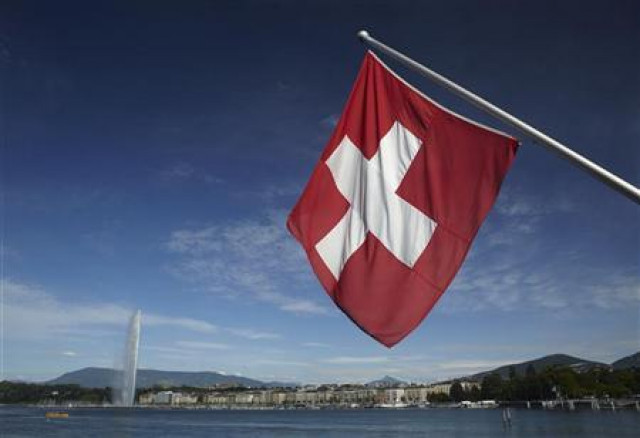Pakistani cash in Swiss banks pulled out?
Delay in treaty may have provided Pakistanis time to park money elsewhere

A Swiss flag is pictured next to the Jet d'Eau (water fountain), and the Lake Leman from the St-Pierre Cathedrale in Geneva June 5, 2012. PHOTO: REUTERS
In September 2014, the federal government decided to renegotiate the treaty despite initialing the agreement. The decision to initial the treaty in Switzerland by the Pakistan’s taxmen was not liked by those who were sitting at the helm of affairs in Islamabad, said sources in the Federal Board of Revenue. The person who negotiated the treaty was transferred out within days of his return to Pakistan. He had been accused of overstepping authority.
However, during this blame game, two precious years have been lost and sources in the tax machinery said many wealthy Pakistanis were among those who were moving out their wealth from Switzerland to other tax havens. Wealthy clients in 2016 pulled out almost $30 billion of untaxed assets from three of the world's biggest private banks, UBS, Credit Suisse and Julius Baer, according to the media reports.
The conversations with officials involved in the process and cabinet’s record showed that the FBR’s 2014 negotiating team had every authority to agree to a new deal with the Swiss government.
The decision to stop the process to sign the revised treaty could have helped those whose names were mentioned in a report of the Federal Investigation Agency. Pakistan Tehreek-e-Insaf has submitted the FIA report in the Supreme Court as evidence against the Sharif family in Panama Leaks case.
The FIA report stated that M/s Ansbacher (Schweiz) AG, Zurich, was administering offshore companies of the Sharif family. The FIA report further stated that “on the instructions of a Director of the M/s Ansbacher company, the two other offshore companies namely Nescoll Limited and Nielson Limited purchased four luxury suites in 1993, 1995 and 1996” in London.
According to Tim Sebastian interview of Hassan Nawaz in 1999, both Nielson and Nescoll were the subsidiaries of a company registered in the British Virgin Islands (BVI), which in turn was being managed by a company based in Switzerland.
In August 2014, Pakistan had initialed the revised treaty with Switzerland, which would have allowed it to get information about $200 billion, which according to Finance Minister Ishaq Dar were stashed in Switzerland by Pakistanis.
In 2014, Switzerland had agreed to exchange all information including confidential bank account information, according to the sources. Had that treaty been implemented, Pakistan would have received first information in January 2015, they said.
In his article ‘Tough Time for PM’, Dr Ikram ul Haq wrote that “using offshore companies, loans worth millions of pounds were obtained from banks in Switzerland and Britain” by the Sharif family.
The negotiating team had given huge tax concessions to the Swiss government on dividend income rates, other income and also agreed to grant Most Favoured Nation status to few sectors in which the Swiss companies have investments, said FBR spokesman Dr Mohammad Iqbal, while defending the decision to call off 2014 treaty negotiations.
However, the sources said that these concessions were given only after Switzerland agreed to exchange the critical bank information and that was the purpose of renegotiating the deal.
There was also an allegation that the negotiating team did not have cabinet approval. But cabinet’s record showed that in September 2013, on a summary submitted by Revenue Division, entitled “Renegotiating Pakistan-Switzerland Avoidance of Double Taxation Agreement (DTA)”, the cabinet allowed the FBR to renegotiate the treaty.
The sources said that a concession of 5% in tax rate on dividend income was allowed only for those companies who would have 50% shareholding –double the existing threshold. This could have incentivised foreign investment.
The sources said that despite absence of OECD and UN prescription towards insertion of a specialised Article on Fee for Technical Services, the negotiating team was able to get this right. Although, effective tax rate was slightly lowered to 7%, the corresponding admissibility of expenses was increased.
But the FBR spokesman insisted that Pakistan has again achieved consensus with the Swiss authorities and a treaty will be signed soon.
Published in The Express Tribune, February 22nd, 2017.


1724319076-0/Untitled-design-(5)1724319076-0-208x130.webp)
















COMMENTS
Comments are moderated and generally will be posted if they are on-topic and not abusive.
For more information, please see our Comments FAQ